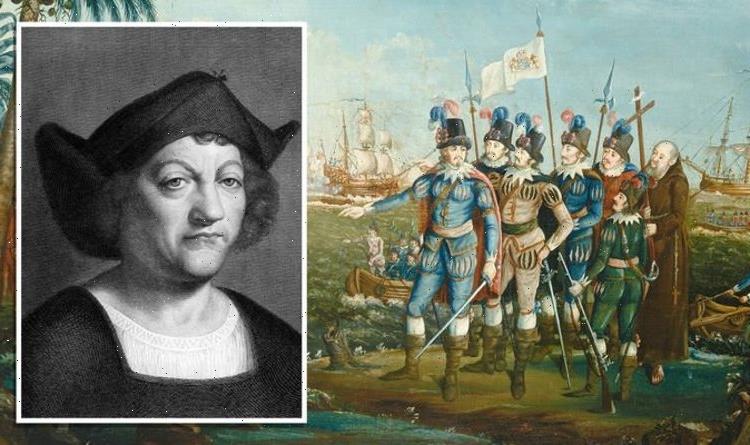Christopher Columbus: Expert claims explorer saw a 'meteorite'
We use your sign-up to provide content in ways you’ve consented to and to improve our understanding of you. This may include adverts from us and 3rd parties based on our understanding. You can unsubscribe at any time. More info
The Italian explorer was not the first European to land on the shores of North America – that honour goes to the Vikings – but his journey west has been the most impactful on world history. In 1492, after obtaining financial backing from the King and Queen of Spain, Columbus set sail across the Atlantic, reaching the Bahamas, Cuba and Hispaniola (modern-day: Haiti and the Dominican Republic). Then, between 1943 and 1946, Columbus led his second voyage to the Americas and delved deeper into the Caribbean where he established a number of cities and outposts.
By the time he died in Valladolid, Spain, in 1506, Columbus had completed four trips across the Atlantic, plundering the Caribbean and securing wealth for the Spanish crown.
His voyages have become synonymous with the discovery of America, though recent years have shown Columbus was far from being the first to reach the New World.
Nearly 500 years before Columbus crossed the Atlantic, archaeological discoveries have shown Viking explorers from Scandinavia reached the shores of modern-day Canada around the year 999 AD.
For the longest time, it was believed the story of these exploits was lost in the annals of time, confined to the myths and folklore of Icelandic sagas.


But new research at the University of Milan in Italy suggests some 14th-century scholars may have been well aware of America’s discovery a whole century before Columbus.
Paolo Chiesa, a researcher at the university’s Department of Literary Studies, has stumbled upon a mysterious document that appears to make the world’s first-ever mention of America in the Mediterranean.
The Latin document, which was penned by the Milanese monk Galvaneus Flamma in 1345, speaks of a land to the west of Greenland.
Dubbed the Cronica universalis, the text marked an attempt to chronicle the history of the world.
Cooper's Treasure: Divers find anchor from Columbus' shipwreck

The discovery was published in the Journal of the Society for the History of Discoveries.
According to Professor Chiesa, America is mentioned in the following passage: “Terra que dicitur Marckalada”
A translation from Latin reads: “The land that is called Marckalada.”
Professor Chiesa wrote in his study: “The Cronica universalis written by the Milanese friar Galvaneus Flamma contains an astonishing reference to a terra que dicitur Marckalada, situated west from Greenland.
“This land is recognizable as the Markland mentioned by some Icelandic sources and identified by scholars as some part of the Atlantic coast of North America.


“Galvaneus’s reference, probably derived by oral sources heard in Genoa, is the first mention of the American continent in the Mediterranean region, and gives evidence of the circulation (out of the Nordic area and 150 years before Columbus) of narratives about lands beyond Greenland.”
Not only does the study challenge the widely held belief that Columbus was the first to set sail for America, but it suggests the explorer may have already had a vague idea about where he was headed.
Professor Chiesa is, however, confident the document reveals a wealth of knowledge was being traded between the Nordic and Mediterranean communities in the first half of the 14th century.
He added: “Furthermore, it brings unprecedented evidence to the speculation that news about the American continent, derived from Nordic sources, circulated in Italy one and half centuries before Columbus.”
The Latin document does, of course, take some liberties when describing the lands of Marckalada.
For instance, it states Marckalada is inhabited by giants who live in buildings made of “huge slabs of stone that nobody could build with them, except huge giants”.
The text also speaks of green trees and animals and a wide assortment of birds.
Flamma wrote: “However, no sailor was ever able to know anything for sure about this land or its features.”
Source: Read Full Article
